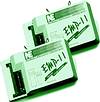Low-cost device programmer
August 2003
PLCs, DCSs & Controllers

The EMP-11 from ProMicro is a low-cost programmer offering Windows support, with a low voltage capability and the ability to program newer chips. Supporting more than 2100 devices, including EPROMs, Flash, 8051-style micros, Microchip PICs, and hundreds of other specialty devices, the EMP-11 is also a good cost alternative to the EMP-24.
To change device families, the user simply changes or flips any one of the four Family Modules. Relays and discrete DAC-controlled analog drivers provide power and ground connections. The EMP-11 uses the same parallel port I/O scheme as the EMP series programmer for a fast communication.
The programmer does not occupy a bus card in the PC, and with only 37,5 x 25 x 200 mm dimensions and a 50 mm high power transformer, the EMP-11 fits into a briefcase or toolbox with ease. The programmer, parallel cable, transformer, and Family Modules, together weigh in at less than 1,3 kg.
The EMP-11 is static-protected at the ZIF socket, Family Module socket, parallel port, and power connector. There is almost nothing to wear out on the EMP-11 as there is no fan nor power switch. The only moving part on the EMP-11 is the Family Module, and that only moves when device families are switched.
Both the EMP-10 and EMP-20 program at speeds near the theoretical maximums of some devices, therefore the digital signals travelling to the device must be clean, and the power and ground lines must be solid. Slide-in connectors can experience noise problems and higher resistance. The connectors that the EMP-10 and EMP-20 use are the same snap-in SIMM connectors that hold the DRAM in many PCs.
The purpose of Family Modules is to allow the use of a few high quality pin drivers, instead of using a cheaper pin driver on each pin on the ZIF socket. This translates to cleaner, more manageable waveforms, at a reduced total cost.
For more information contact Elton Prytz, ProMicro, 011 706 7913, [email protected], www.promicro.co.za
Further reading:
ABB technology for greater circularity in metals and mining industries
PLCs, DCSs & Controllers
ABB has been selected by GreenIron, an innovative Swedish company working in the mining and metals industries with its patented materials reduction technology, to provide automation and control system solutions for a first commercial facility in Sandviken, Sweden.
Read more...
EtherCAT Box modules for confined spaces
Beckhoff Automation
PLCs, DCSs & Controllers
Users of EtherCAT and EtherCAT P Box modules from Beckhoff’s EP and EPP series benefit from 25 years of IP67 expertise in the I/O sector. The broad product range for decentralised distribution of the I/O level directly at the machine or system has been continuously expanded and further developed during this time.
Read more...
ABB updates distributed control system
ABB South Africa
PLCs, DCSs & Controllers
Leveraging 30 years of continuous innovation and reliability, ABB’s updated Freelance 2024 distributed control system (DCS) offers greater plant adaptability, faster and more reliable device communication, improved system security, and seamless data exchange.
Read more...
Four ways modern operations control can boost sustainability and efficiency
PLCs, DCSs & Controllers
With the growing importance of digital transformation, HMIs and scada have evolved from control panels to vast operational hubs. Next-gen HMI/scada can bring together data, personalisation, and advanced insights to successfully achieve organisational goals, it is important to think about HMI/scada holistically within the operations ecosystem.
Read more...
The convergence of intelligence: DCS, SCADA and TLC
Schneider Electric South Africa
PLCs, DCSs & Controllers
In the early days of industrialisation, control systems were primarily mechanical, and relied on manual intervention and simple feedback loops to manage processes. Now, in the 21st century, industrial process automation systems are mind-blowingly intelligent, and provide almost unparalleled control and monitoring capabilities, making them integral to modern industrial systems.
Read more...
PC-based control for advanced hydrogen storage technology
Beckhoff Automation
Editor's Choice PLCs, DCSs & Controllers
The proportion of renewable energies from solar, wind and water is rising continuously. However, sufficient storage options are of the essence to use these energies as efficiently as possible. GKN Hydrogen offers a particularly compact and safe option, low-pressure metal hydride hydrogen storage systems with PC-based control from Beckhoff.
Read more...
ABB modernises key board mill
ABB South Africa
PLCs, DCSs & Controllers
ABB has secured a landmark contract to modernise Smurfit Kappa’s Paper Machine 5 at its corrugated cardboard mill near Mexico City. ABB will provide Smurfit Kappa with DCS, accompanied by a comprehensive paper machine drives system, encompassing some of the market’s most advanced drives and motors meticulously designed to optimise PM5’s performance.
Read more...
The synapses of the distributed control system
Schneider Electric South Africa
PLCs, DCSs & Controllers
Industrial operations require a distributed control system (DCS) to coordinate and control their process subsystems in real time. Like the brain, a DCS is a multitasking maestro, controlling and coordinating complex processes in a myriad of industrial setting such as large manufacturing plants, providing valuable top-down control.
Read more...
Modular assembly platform for clean manufacturing
Beckhoff Automation
PLCs, DCSs & Controllers
JR Automation delivers custom automated solutions for numerous industries. It has done this through its scalable, modular automation platform, FlexChassis, which speeds up time to market while cutting costs. The company chose the XTS linear transport system from Beckhoff because of its speed, and modular design that allows for multiple configurations.
Read more...
Selecting the best remote access solution for your application
PLCs, DCSs & Controllers
In today’s Internet of Things (IoT) world, remote mobile access is a necessity for many industrial applications. There are several ways of implementing this connectivity with routers and virtual private networks.
Read more...

